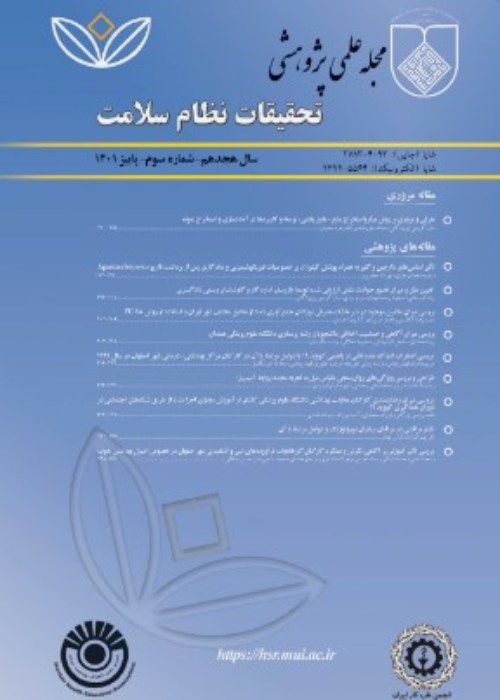Citizenship in Schools: A Descriptive Study Based on the Theory of Reasoned Action
Author(s):
Abstract:
Background
Citizenship education is increasingly considered as an important، necessary strategy to protect the youth against psychosocial pathologies and to empower them to take responsibilities and play their individual as well as social roles. The present study aimed to investigate students’ levels of knowledge as well as their intention، subjective norms and attitudes toward the characteristics and skills of citizenship utilizing the theory of reasoned action. Methods
In this descriptive analytic study، three schools were randomly selected from 12 girls’ high schools of Shiraz، Iran (one as the experiment group and the other two as the control groups). One class in each major (math، science، and human sciences) was randomly selected to take part in the study. Overall، 228 students (91 in the experiment group and 137 in the control group) participated in the study. A 62-item self-administered questionnaire was used to collect data. Content validity of the instrument was confirmed by seven experts in health education، sociology، and social sciences. A test-retest pilot study showed desirable reliability of the questionnaire in terms of the constructs of the study including knowledge (r = 82%)، attitude (r = 97%)، subjective norms (r = 94%)، and behavioral intention (r = 97%). Findings
The students’ level of knowledge (7. 84 ± 1. 98 out of 15) and attitude (75. 38 ± 7. 44) were relatively low. Although levels of subjective norms (23. 24 ± 4. 33) and behavioral intention (18. 07 ± 3. 03) were almost desirable، they were below the ideal levels. There were significant correlations between attitude and knowledge (P = 0. 037; r = 0. 139)، attitude and behavioral intention (P = 0. 003; r = 0. 199)، subjective norms and behavioral intention (P = 0. 310; r = 0. 143)، and subjective norms and attitude (P = 0. 008; r = 0. 174). There were not any significant statistical relationships between demographic variables and the core constructs of the study. Conclusion
Considering undesirable levels of students'' knowledge and attitudes، well-designed citizenship education programs based on the theory of reasoned action are recommended. Acceptable levels of behavioral intention and subjective norms suggest the effectiveness of such programs.Keywords:
Language:
Persian
Published:
Journal of Health System Research, Volume:8 Issue: 5, 2013
Pages:
857 to 865
magiran.com/p1094250
دانلود و مطالعه متن این مقاله با یکی از روشهای زیر امکان پذیر است:
اشتراک شخصی
با عضویت و پرداخت آنلاین حق اشتراک یکساله به مبلغ 1,390,000ريال میتوانید 70 عنوان مطلب دانلود کنید!
اشتراک سازمانی
به کتابخانه دانشگاه یا محل کار خود پیشنهاد کنید تا اشتراک سازمانی این پایگاه را برای دسترسی نامحدود همه کاربران به متن مطالب تهیه نمایند!
توجه!
- حق عضویت دریافتی صرف حمایت از نشریات عضو و نگهداری، تکمیل و توسعه مگیران میشود.
- پرداخت حق اشتراک و دانلود مقالات اجازه بازنشر آن در سایر رسانههای چاپی و دیجیتال را به کاربر نمیدهد.
In order to view content subscription is required
Personal subscription
Subscribe magiran.com for 70 € euros via PayPal and download 70 articles during a year.
Organization subscription
Please contact us to subscribe your university or library for unlimited access!



